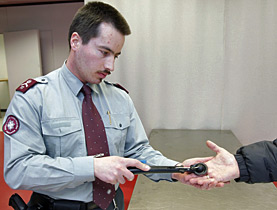
Swiss border guards could be deployed abroad

People trying to cross the border into Poland, Greece or any of the Baltic states could in future be met by Swiss border guards.
The Swiss government says it could be called on to contribute to the patrolling of the outer perimeter of Europe’s Schengen zone.
This would be possible after November when Switzerland is expected to become a member of the passport-free zone which extends from Portugal in the west, Italy and Greece in the south, Finland in the north and several new European Union member states in the east.
On Wednesday, the finance ministry said Switzerland could take part in operations by Frontex, the European Union agency responsible for coordination between Schengen members on border security.
Switzerland could be asked to provide guards for limited deployments to Frontex’s newly-created Rapid Border Intervention Teams (Rabit). Swiss involvement would cost SFr2.3 million ($2.07 million) a year.
The Swiss parliament will have the final say on Switzerland’s contribution but the finance ministry warned that refusal to participate could be seen by the European Union as a breach of Schengen terms.
Also on Wednesday, the European Commission announced plans to tighten border controls which will have an impact on all Schengen member states, including Switzerland.
Justice and Security Commissioner Franco Frattini said the focus would be on better use of modern technology “to facilitate travelling of honest people, while preventing terrorists, criminals, and illegal migrants from entering the EU”.
Electronic register
This would include an electronic register similar to a policy adopted by the United States after the September 11, 2001, attacks, and could go into effect by 2015.
The entry/exit register would collect fingerprints and pictures of all foreigners entering the Schengen area for a stay of up to three months, the Commission said in its proposal.
The database would record the time and place of entry, the length of stay authorised, and would automatically alert authorities if a person stayed longer than allowed.
The register, which has sparked privacy concerns, could be complemented by a form air travellers would fill in on the internet before flying to the bloc.
The extra security measures could be compensated by accelerated, automated check-in procedures for registered travellers considered safe enough by consular authorities.
“We cannot have mafia, or traffickers, or terrorists, using better technology than our police,” Frattini said.
The EU already stores asylum-seekers’ fingerprints and plans the same for visa applicants.
EU citizens would not be fingerprinted in the new register but nearly all of them already have to give fingerprints to be stored in an electronic chip on new passports.
swissinfo with agencies
The Schengen Area comprises 24 countries, most of which are members of the EU, as well as the four member countries of the European Free Trade Asssociation – Iceland, Norway, Switzerland and Liechtenstein.
Britain and Ireland are not in the zone, but they have signed up to agreements on security.
A key element of the Schengen agreement is the Schengen Information Service (SIS), which includes a huge database in the French city of Strasbourg.
The SIS database enables police in any Schengen state to find out whether a suspect has been involved in any kind of crime across the EU.
The Schengen treaty takes its name from a town in Luxembourg where it was signed by Germany, France and the Benelux states in 1985.

In compliance with the JTI standards
More: SWI swissinfo.ch certified by the Journalism Trust Initiative
















![The four-metre-long painting "Sonntag der Bergbauern" [Sunday of the Mountain Farmers, 1923-24/26] had to be removed by a crane from the German Chancellery in Berlin for the exhibition in Bern.](https://www.swissinfo.ch/content/wp-content/uploads/sites/13/2025/12/01_Pressebild_KirchnerxKirchner.jpg?ver=cb688ed5)














You can find an overview of ongoing debates with our journalists here . Please join us!
If you want to start a conversation about a topic raised in this article or want to report factual errors, email us at english@swissinfo.ch.